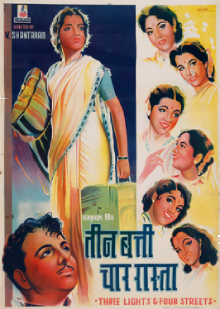| Teen Batti Char Raasta | |
|---|---|
 Film poster | |
| Directed by | V. Shantaram |
| Written by | Dewan Sharar |
| Produced by | V. Shantaram |
| Starring | Sandhya Shashikala Sheila Ramani Karan Dewan |
| Cinematography | G. Balakrishna |
| Music by | Shivram Krishna |
Production company | |
Release date |
|
Running time | 112 minutes |
| Country | India |
| Language | Hindi |
Teen Batti Char Raasta (transl. Three Lights & Four Streets) is a 1953 Hindi-language comedy drama film on national integration directed by V. Shantaram.[1] The film was made under the Rajkamal Kalamandir banner and produced by Shantaram.[2] The story and dialogue were by Diwan Sharar while the cinematography was by G. Balkrishna. With music composed by Shivram Krishna, it had lyrics by Pyare Lal Santoshi.[3] The star cast included Karan Dewan, Sandhya, Shashikala, Nirupa Roy, Sheila Ramani, Dewan Sharar and Lalita Kumari.[4]
The film, which portrays national integration,[5] involved a family, whose patriarch Lala Gulabchand (Diwan Sharar), is a Punjabi married to a woman from Uttar Pradesh. He lives near a crossroads with three lights and four streets. The crossroads is used symbolically as a union of the different states and religions in the country, as mentioned in the film. Their five of six sons then marry girls from five different states in India and the story follows the chaos that ensues. The film had a sub-plot weaved into it in the form of a dark-complexioned girl, Shyama (Sandhya), who is first humiliated by the hero Ramesh (Karan Dewan), and then accepted by him as he falls in love with the "real person".[6]
- ^ Bhagwan Das Garga (1996). So many cinemas: the motion picture in India. Eminence Designs. ISBN 978-81-900602-1-9. Retrieved 19 February 2015.
- ^ Nilu N. Gavankar (2011). The Desai Trio and the Movie Industry of India. AuthorHouse. pp. 170–. ISBN 978-1-4634-1941-7. Retrieved 19 February 2015.
- ^ "Teen Batti Char Raasta". myswar.com. MySwar.com. Retrieved 19 February 2015.
- ^ "Teen Batti Char Raasta". Retrieved 19 February 2015.
- ^ D. P. Mishra; India. Ministry of Information and Broadcasting. Publications Division (1 September 2006). Great masters of Indian cinema: the Dadasaheb Phalke Award winners. Publications Division, Ministry of Information and Broadcasting, Govt. of India. ISBN 978-81-230-1361-9. Retrieved 19 February 2015.
- ^ Bhawana Sommya / Jigna Kothari / Supriya Madangarli (9 January 2013). MOTHER MAIDEN MISTRESS. HarperCollins Publishers. pp. 1941–. ISBN 978-93-5029-485-7. Retrieved 19 February 2015.